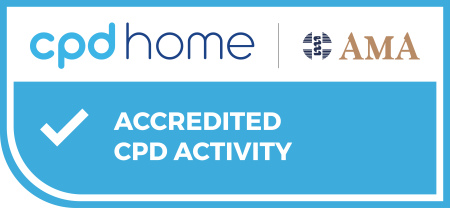Finding accredited CPD
This course consists of six detailed units, each addressing a crucial aspect of managing the familial risk of breast and ovarian cancers.
Unit 1: Genetics
This unit provides an introduction to cancer genetics, exploring how hereditary cancers are transmitted through families and the importance of genetic counselling. Participants will learn about key genetic mutations, such as BRCA1 and BRCA2, and the distinction between sporadic, familial, and hereditary cancers. The course emphasises the role of genetic mutations in cancer development and the value of genetic risk assessments for both patients and family members.
Unit 2: Familial Breast Cancer
This unit focuses on the hereditary aspects of breast and ovarian cancers, explaining the genes associated with an increased cancer risk, including BRCA1, BRCA2, and other relevant genes. It highlights genetic testing criteria, screening recommendations, and family history indicators that suggest a higher predisposition to cancer. Case studies, such as the widely recognized "Angelina Effect," help illustrate the impact of genetic testing and preventive measures.
Unit 3: Genetic Testing
Participants will explore the processes involved in genetic testing, including panel testing and how results are interpreted. The unit covers different testing options, such as BRCA1/2 testing and multigene panels, while discussing the complexities of variants of uncertain significance (VUS). The course also addresses the psychosocial and ethical considerations of offering genetic testing and explains the importance of pre- and post-test counselling.
Unit 4: Management
This unit examines the management of patients at high risk of breast and ovarian cancers. Topics include risk-reducing surgical options, surveillance strategies (such as MRI and mammography), and the role of medications like tamoxifen. The unit also discusses the challenges in determining individual risk and making personalised decisions about treatment and management based on family planning and lifestyle factors.
Unit 5: Counselling
The counselling process is crucial for helping patients navigate genetic risk and management decisions. This unit emphasizes the importance of emotional support, addressing family dynamics, perceptions of risk, and the challenges of communicating genetic information to family members. Healthcare providers will learn how to offer sensitive, patient-centred guidance to families dealing with cancer predisposition syndromes.
Unit 6: Reproductive Options
This final unit explores the reproductive options available to individuals with a known cancer predisposition gene, such as BRCA1/2. Topics include pre-implantation genetic diagnosis (PGD), prenatal testing, and the ethical considerations involved in family planning. The unit also provides an overview of assisted reproductive technologies and the complexities of using IVF for genetic testing.
This course equips healthcare professionals with the knowledge and skills needed to provide comprehensive care and genetic counselling to patients and families facing an increased risk of breast and ovarian cancers.
Cost: $195
Suitable for: All degree qualified medical practitioners.
Study mode: 100% online
Disclaimer: Please note, once you click 'Register now' you will be leaving the AMA’s CPD Home website and entering a third-party education provider’s website. If you choose to register for this learning, you will need to provide some of your personal information directly to the third-party education provider. If you have any queries about how third-party education providers use, disclose or store your personal information you should consult their privacy policy.
Upon completion, your CPD activity record may take up to 4 weeks to be reflected on your CPD Home Dashboard.
You have to log in to see the content of this module.
Provided by
Accredited by

*Medical Board of Australia’s (MBA)’s revised Registration Standard: Continuing professional development (the Standard)